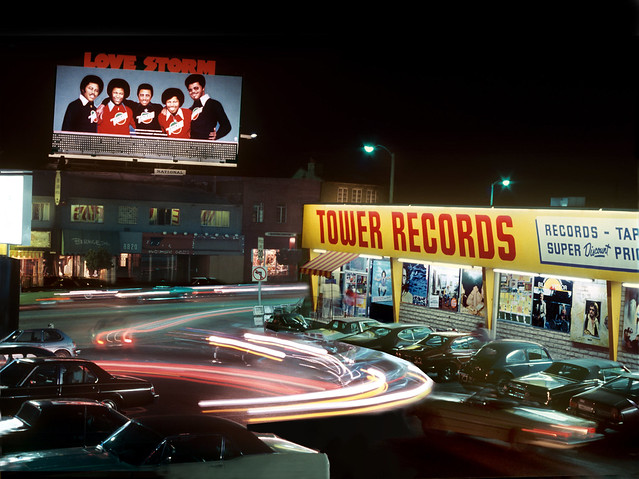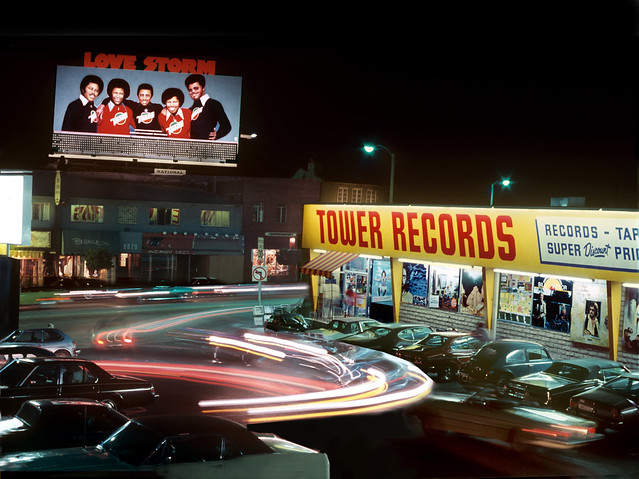
Tower Records on the Sunset Strip in Los Angeles circa 1980 (Photo courtesy “All Things Must Pass”)
Editor’s Note: “All Things Must Pass: The Rise and Fall of Tower Records” documents the history of the iconic music retail company, once based in Sacramento, Calif. It’s playing locally at Landmark E Street Cinema. Our own Neal Keller, DJ, sound engineer, and man o’ music, worked at the DC location of Tower Records (formerly at 2000 Pennsylvania Ave. NW, DC) from 1985-1994. Here, he shares some memories in response to seeing the documentary.
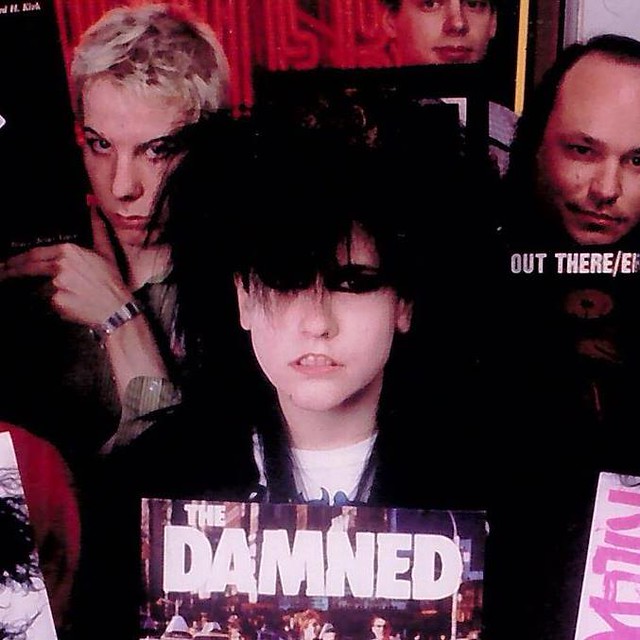
DC employees of Tower Records (including Neal, left), photographed for US News and World Report sometime in the late ’80s, as they hold up their favorite records of the week. Neal’s record is Richard Kirk’s “Black Jesus Voice.”
“One more item: We need someone to drive Russ’ rental car back to the rental place.”
My hand shot right up. The setting was a supervisors meeting at the Pennsylvania Avenue location of Tower Records in DC—the year was 1991 (or maybe ’92). I was one of the supervisors at the Tower DC store, and the company’s owner Russ Solomon was coming through for an inspection of the place. Chief Operating Officer Stan Goman would be coming through as well, along with other members of the top brass.
Apparently, they would be arriving in one vehicle and transferring to another back at the hotel on M Street; I wasn’t clear on the details. But what was clear is that if I volunteered to get the rental car back to Hertz, I’d be out of the store for a few hours, and maybe even dodge doing count out.
“I’ll do it,” I said.
“All right, Keller, you got the duty,” said Bill, the store’s assistant manager. “When they get here, just stick with them and do what they tell you.” I suppose I was chosen for the task because, in addition to being the only one to volunteer, I was one of the few licensed drivers on the very cosmopolitan Tower supervisors’ staff.
This and other memories of my Tower Records days came flooding back to me this past Friday night as I watched the documentary film “All Things Must Pass: The Rise and Fall of Tower Records” from a seat in the Landmark E Street Cinema. I was surrounded by my peers, including several people I worked with at the DC location 30 years ago.
On the screen, we watched the story of the rise and fall of Tower Records, as recounted by Russ Solomon, Stan Goman, and many of the other people we worked for once long ago. The film was directed by Colin Hanks, and traces the arc of the company through still images, archival film, testimonials, and news footage. Many of the people who built and ran the company appeared for interviews, including Russ himself, along with Stan, Heidi Cotler, Bob Delanoy, Mark Viducich, and several others. One very gratifying revelation for us as viewers was that just about every one of them started out in the company as a clerk, filing records in the bins. Many of us watching the film Friday night could make the exact same claim.
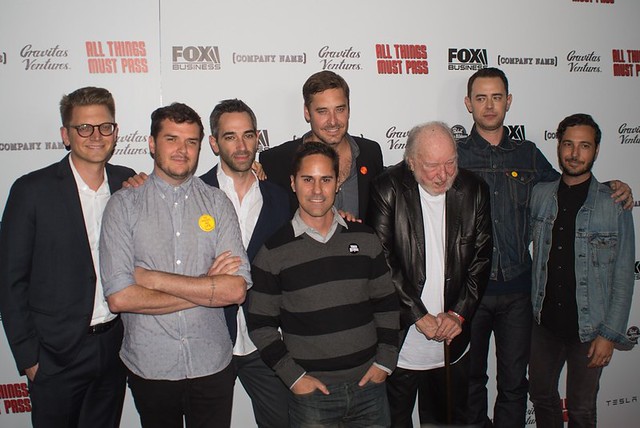
Nicholas Ferrall (left), Bridger Nielson, Glen Zipper, Darrin Roberts, Sean Stuart, Russ Solomon, Colin Hanks, and Steven Leckart attend the premiere of All Things Must Pass. (Photo by Mathew Tucciarone)
In addition to Tower’s surviving executive staff, the filmmakers interviewed music biz moguls like David Geffen, and legendary rock stars Bruce Springsteen, Elton John, and Dave Grohl. Ironically, I met both Elton and Dave through my association with Tower. Elton did an insider-only record signing at a recording studio back in 1988 (not coincidentally, the same one for which I am currently employed) and I got to attend. As for famous Foo Fighter (and one-time DC punk rocker) Dave, he worked at the Tower DC store the summer before he headed out to Seattle. As one of the supervisors at the time, I had to write up a late slip or two for Dave. I have to wonder if there’s still a personnel file for Dave, tucked into a box of dusty files somewhere with those slips in it.
Rock legends notwithstanding, the central figure in the film is Russ Solomon, and as he told the story of his record retailing empire, I was prompted to recall the story of the time I met him.
“You’re glue; you stick to me, kid. Where I go, you go. Got it?”
These were the instructions I got from Stan after I told him that I was tasked with returning their rental car once they finished their inspection of store #17-130 (our DC store). And stick to him I did. I didn’t realize that I would be a fly on the wall as he dressed down the store’s general manager (my boss), but that’s what proceeded to take place. I suppose I could have savored a little karma there, but our GM was a good guy, so I tried to be inconspicuous as he got picked on by the execs.
After the nagging session was completed, I followed Russ and Stan to the limo parked outside on 21st Street. I fought to suppress a self-satisfied smile as I took in the luxury. “Hey, I’m still on the clock,” I thought! I shared a little chit chat with Stan as we waited on another passenger. Stan had a reputation of being a business-focused A-type personality, a foil to Russ’ relaxed demeanor. He was amusingly terse and pointed as we spoke, rather reminiscent of one of Joe Pesci’s characters. “Where is this guy already? Can we get going? I’m starving.”
The party we were waiting on eventually climbed aboard, and we were off.
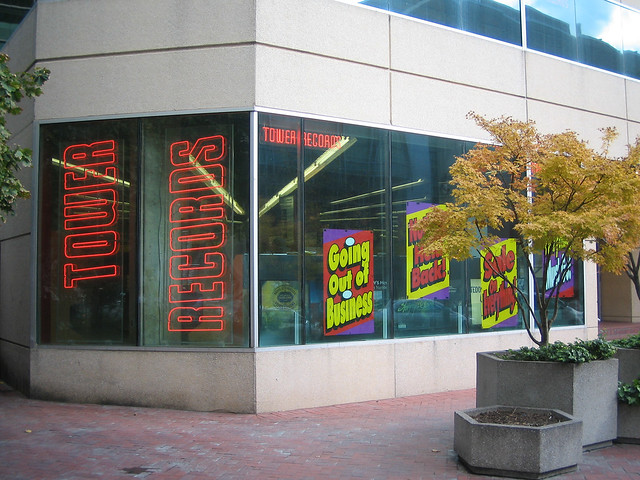
Outside the Pennsylvania Ave. location of Tower Records in DC before it finally closed its doors on Dec. 22, 2006.
En route, Russ shared with me that there was a lot of discussion taking place about whether retail establishments like Tower were offering their employees a livable wage. This was especially a concern for stores in the big cities. So he asked me, point blank, if he thought I was making a decent wage, and whether it was enough to get by.
I briefly considering responding by saying, “Are you asking because you’d like to know if you could pay me in free records? Because you probably could (but they’d all have to come from the import section).”
I wasn’t sufficiently confident as to the depth of Russ’s sense of humor, so I thought better of wisecracking with the owner of the company. Besides, Stan gave me the impression that he didn’t find much to laugh at (of course, I was wrong about that). So instead, I responded that I was getting by just fine. I include the details of this exchange because similar discussions are still going on today in the country’s service industries. I’m pretty sure that in asking me the question, what they wanted to hear was that the wages were fine and everybody was chill.
This was more or less true in my case. I was getting by okay, and anyways I was deep in the midst of my “starving artist, slave to the rhythm” ‘80s lifestyle at the time. It wouldn’t be right to blame my inclination to mortgage my future on them.
But here was the owner of a multinational company, one that was a significant force in the music business, asking the question. And I believe he was sincerely interested in the answer. Are the people at the helm of today’s big retail chains interested in asking the same question? Would they care about the answer? Don’t ask the millennials coming up through the same ranks that I did for their opinion; you probably won’t like the answer.
This exchange pointed to the general character of Tower’s head honcho. Again and again, the film makes the case that Russ Solomon is a pretty good guy when all is said and done. It’s a given with this genre of film, though, that the central character would get this kind of affectionate treatment. And Mr. Hanks’ documentary doesn’t deviate too much from the mold for this type of fare. I suppose one could fault the film for following a fairly set trajectory in telling its story. It is reminiscent of other rags-to-riches-to-bust fables.
Simply in the form of presentation, it made me think of “American Movie” and “Who Killed the Electric Car?” complete with the uplifting conclusion. Actually, the ending kind of recalled “This Is Spinal Tap,” but I wouldn’t want to reveal too much. And it’s worth noting that while neither “Empire Records” nor “High Fidelity” were documentaries, a lot of their respective origins trace right back to the Tower Records experience.
While “All Things Must Pass” isn’t trying to uncover an alleged conspiracy, as “Who Killed the Electric Car?” attempted to do, it does offer some very compelling insights into the upheavals in the record business that went on during the previous decade. For those who watched the very concept of record retail crumble from underneath us, the film does a great job of exploring the causes of Tower’s decline. Surprise! It can’t all be blamed on Napster and the MP3. Our economy and technology is in the midst of a generational change, and this is one of the most valuable messages in the film. That other forms of retail and service industries continue to experience tremors was probably on the minds of those in the audience, as many of them jumped from Tower to similar forms of employment when Tower’s demise was in sight.
Tower fell, as other retailers have done and will continue to do. But I can attest to the fact that Tower was a special place. From the reactions from my peers at the film’s conclusion, as well as during the group photo sessions in the theater’s lobby afterward, other folks feel the same way. The number of people I’ve encountered in the DC scene who can trace a shared experience back to Tower is actually kind of staggering. I even know a few people who feel that, having never worked at Tower, they missed out on something. (Kids, careful what you wish for. You never had to be there at 6:30 in the morning in the middle of February for a 12-hour inventory—WITH, I’d like to point out, the store OPEN!)
Happily, this shared experience is the source of the film’s humor, and there’s lots of it to enjoy. There’s tales of drink and debauchery, hedonism and excess that go back to the company’s origin in the ‘60s. There’s no generation gap amongst Tower’s alumni, because we saw the same crazy shit during the ‘80s, and so did the crowd that followed us into the ‘90s.
Watch the trailer for “All Things Must Pass,” which opens with comment from Dave Grohl, on YouTube:
[youtube https://www.youtube.com/watch?v=JCPYCIzSw_o]
At one point, Russ explains the importance of the company’s dress-code policy (or complete lack of one) to the morale of the employees. It may have gone way beyond that—to be both a reflection of and an instigator for the look of each respective pop culture era that was part of Tower’s history. Several of us looked on from our seats in the theater, and no doubt thought back to some of the wild get-ups we used to wear to work. Thank goodness that most of the evidence is long gone.
For my own personal experience in this regard, I hesitate to mention that I was personally photographed and featured in the Washington City Paper’s “Best Of” issue for 1986. My heavily goth’ed up likeness was used to embellish Tower’s win in the category of “Employer of Last Resort.”
Consequently, as one of the former hair people of Tower DC, I got a HUGE kick out of seeing timeless Tower archetypes appear and reappear in “All Things Must Pass.” From the trailblazing almost-solitary female employee to the art department ingénues, they’re in the film just as surely as they were at every store. Little did we know that the first incarnation of these characters later became Sacramento’s ruling executive staff!
In that vein, the film’s most entertaining character is definitely Mark Viducich, the perennial model of the shipping/receiving clerk. Every store had a warehouse fiefdom run by a pair of invoice chasing gendarmes just like this guy. God help you if you were on their bad side, because it was a long walk all the way around Tower Classical if you wanted to get to the employee lounge without crossing their path. Tellingly, his thoughts on the final days of the company are among the film’s most poignant. If the company you love is ever forced to suffer a receivership managed by a bunch of soulless banking trustees, you’ll know his pain.
So would those who never worked at Tower, or retail in general, be able to enjoy “All Things Must Pass”? I think so. Unless you leapt right out of your poli-sci program and right into a K Street lobbying firm, you probably spent some of your college days schlepping boxes for somebody in order to make ends meet. I know at least one prosecutor who spent her off campus time alphabetizing CD singles back then. But I would recommend the film just as much for its examination of the changing economic realities of our times as I would for nostalgia value. Changes which hardly seem to have settled in — even at this point. But even more than that, I would recommend it for the sake of the larger time capsule of the era in which it should be included. The record store as a fading and nearly forgotten concept. None of us ever would have imagined it.
Strange days, indeed.
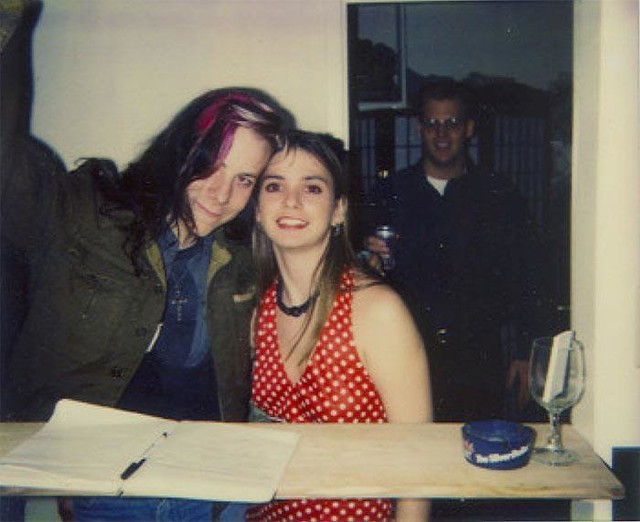
Neal (left) demonstrates his own personal dress code circa his time as a Tower Records employee. (Photo courtesy Neal Keller)
After a brief ride, Russ’ limo pulled up to one of the swanky hotels over on M Street. Stan and some of the others headed up to their rooms to get ready for dinner, but Russ saw no such need. He turned to me and suggested we have a drink at the hotel’s bar. He wasn’t quite sure what he wanted, but when I ordered a Dos Equis, he told the waitress to “make it two.” This was over a decade before that beer maker’s “World’s Most Interesting Man” advertising campaign. But you know, Russ could’ve been the model for that dude. I asked Russ at what point he was going to have to change the name of his store from Tower Records to Tower CD’s or something. He laughed, and asked me, “Son, just what is a record?”
“I don’t know, a vinyl LP I guess,” I replied.
“Not in my day. In my day, it was the 45 RPM single. Before that you had 78’s, Victrola’s—acetates for chrissake! The definition changes with every generation. They’re all records. And what we’ll be selling in the future will still be records as far as I’m concerned, no matter what they look like.”
We chatted a little further, and then he got up and left the table for a few minutes. When he returned, I told him about how one of the cocktail waitresses had scurried over in his absence and excitedly asked me if I was Tom Petty. After all, here I was, a long-haired dude in the company of a major figure in the music industry. Russ laughed when he heard this.
“I hope you told her you were! You might have gotten laid!”
Yup. Russ Solomon. An all-around good guy. I didn’t need the movie to convince me of that.
Parklife DC contributor Neal Keller is a professional sound engineer at Omega Studios as well as DJ of the long-running ’80s Dance Party at Tropicalia! For more on Neal, visit http://www.80sdanceparty.com.
